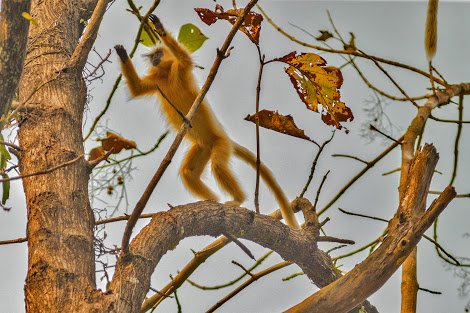MANAS: Return Of The Giants
A wild paradise of Assam
.jpg)
.jpg)

A habited, Nature lives itself, Manas, A wild paradise of Assam situated on foothills of the Himalaya, riches in biodiversity and it’s Heritage. The floating river, big evergreen tree, animals and birds lives their lifes with united song. Its beautiful scenery and weather always been the attractive point. How nature lives life wild, how wind, bird and flowing river makes a natural chorus, how animals make bond together, you cannot be able to observe, if you don’t see the natural beauty of Manas National Park of India.
Manas Park is consist of two parts, one belongs to Indian region, called Manas National Park and another one situated on Bhutan territory, which is known as Royal Manas Park. The park is known for its rare and endangered endemic wildlife such as the Assam roofed turtle, hispid hare, golden languor, pygmy hog, wild water buffalo and royal bangal tiger. The biodiversity of Manas National park is very rare to see other part of the earth. Some endangered and nearly exiting species found only in this National park eg, Pigmy hog and Golden Languor. During two decades of 1980-2000, Manas was struggling with massive problems.
Growing terrorism in that reason and heavy poaching were two major problems which affected Manas National park in past two daces. For this reason, in 1992 UNESCO declared Manas as a World Heritage Site in danger. But now Manas is rising from ases. Poching and terrorism is now past for Manas. And for this reason UNSECO removed Manas from the list of World Heritage Site in danger.

According to local stories, the name of the park is generated from the Manas River, flowing North to South West dividing the park into two parts, which is named after the Goddess Ma Manasa, daughter of lord Siva. The river passes through the park and splits into three rivers as it reaches the plains viz. Naljhara, Beki and Ultaikhunda.The Naljhara and Beki river later on join together near Barpeta Road and called as Beki River. On the other side the third part of Manas River flows toward South-West side via Kamargaon, Burikhamar, Bhulokadoba (There are some page which have the wrong data that Manas River is divided into two parts, Beki and Bhulukadoba). Beki River is a major water source of Mighty Bramhaputra. The Manas River also serves as an international border dividing India and Bhutan. The bedrock of the savanna area in the north of the park is made up of limestone and sandstone, whereas the grasslands in the south of the park stand on deep deposits of fine alluvium. The combination of Sub-Himalayan Bhabar Terai formation along with the riverine succession continuing up to Sub-Himalayan mountain forest make it one of the richest areas of biodiversity in the world. Manas National Park occupies an area of 500 sq. km and it is located at the foothills of the Bhutan Himalayas in Baksa and Chirang districts of Assam in between 26°35'-26°50'N latitude and 90°45'-91°15'E longitude. The National Park consists of three ranges namely -the Western Range with its headquarters at Panbari, the Central Range with Bansbari as its headquarters near Barpeta Road, and the Eastern Range with Bhuyapara near Pathsala as its headquarters .Out of the three ranges, two ranges namely Bansbari and Bhuyapar are under the Baksa district with an area of 394 sq. km. and the Panbari Range (106 sq.km.) is under the Chirang district.
The park is well known for species of rare and endangered wildlife that are not found anywhere else in the world like the Assam roofed turtle, hispid hare, golden langur and pygmy hog.The Manas hosts more than 450 species of birds. There is only one forest village, Agrang, in the core of the national park. Apart from this village 56 more villages surround the park. Many more fringe villages are directly or indirectly dependent on the park. From 1980-200 Manas National Park had in a huge terrible condition. Heavy poaching, terrorism and forest destruction was bunging problem of Manas. Recently terrorism and rate of poaching are under controlled. But they are not totally demolished, therefore a few incident of poaching and camping of terrorist activists are reported.
If you like the information, don't forget to visit Manas National Park. And plz Upvote the story.
Thanx...
Congratulations @northeastmedia! You have completed the following achievement on Steemit and have been rewarded with new badge(s) :
Click on the badge to view your Board of Honor.
If you no longer want to receive notifications, reply to this comment with the word
STOPThanx
upvote and comment done do for me
Done
Nice article
Posted using Partiko Android
Thanx bro
@northeastmedia, thank you for supporting @steemitboard as a witness.
Click on the badge to view your Board of Honor.
Once again, thanks for your support!